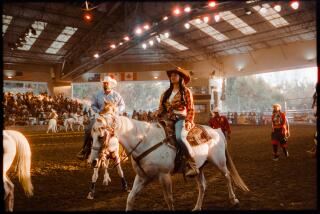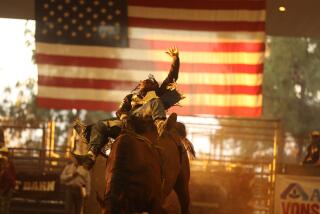Lu Vason dies at 76; highlighted role of black cowboys
- Share via
Lu Vason was not the Hollywood image of rodeo. He grew up in Berkeley, he didn’t ride or rope, he worked for a while as a barber and beautician, he was neither lean nor mean and he was African American.
But he also had an eye for opportunity and a fascination with history.
On a visit in the early 1980s to the annual Frontier Days extravaganza in Cheyenne, Wyo., Vason was intrigued by his first rodeo but perplexed by the lack of African American competitors. Back in Denver, where he had moved as an entertainment promoter in 1977, he toured the Black American West Museum and discovered a trove of material about African American cowboys in addition to the bandits, lawmen, soldiers and ordinary citizens who were a vital part of the region’s history.
In 1984, Vason founded a new rodeo, named it after the once-famous black cowboy Bill Pickett, and drew thousands of African American fans to the sport in tours that still crisscross the U.S.
Vason, 76, died in a Denver hospital May 17. He had a history of heart disease, said Wil Alston, a family spokesman.
Some historians estimate that as many as a quarter of the West’s cowboys were black, with many heading to the open range after the collapse of slavery in the South.
Pickett, who was born in Texas in 1870, was a cowhand from the age of 10. He was one of 13 children of former slaves and is seen today as the father of steer wrestling, where cowboys leap from their horses, grab steers by the horns and bring them down. Pickett sometimes added his own twist by sinking his teeth into a steer’s lower lip.
Will Rogers was a big fan of Pickett, and so was Vason.
“Before I started this, I didn’t know about Bill Pickett,” he told the Memphis Commercial Appeal in 2012. “If I didn’t know him, I know other blacks didn’t know him. So that was my charge from then on: To expose the myth that there were no blacks involved in the development of the West or in rodeo. That’s what has carried me on till now.”
Although black cowboys were involved in rodeo for decades, they sometimes were forced to appear before or after the sanctioned, big-draw events. Often they endured the same hostile condition on the road that greeted other black performers.
Born in New Orleans on April 11, 1939, Vason was raised in California.
As a young man in the Bay Area, he promoted music groups including the Pointer Sisters and the Whispers. In Denver, he worked with concert impresario Barry Fey.
Vason’s survivors include his wife, Valeria Howard-Vason; a sister; seven children; and 15 grandchildren.
He also mentored many rodeo performers, some of whom refer to him as “Dad.”
On tour with the Pickett rodeo in South Dakota, he met a young cowboy named Lynn “Smokey” Hart, who eventually worked for him as a bullfighter and rodeo clown.
“Through the years, he took me under his wing and taught me so much,” said Hart, who, with Vason’s encouragement, did stunts in TV westerns.
“He got me into the movie industry,” Hart said. “He taught me about soul food. He said to me, “You’ve never had a pig ear sandwich? Come on boy, let’s get a pig ear sandwich!’ ”
“He taught me my blackness,” said Hart, who is half Lakota Sioux and half African American.
Twitter: @schawkins
More to Read
Start your day right
Sign up for Essential California for the L.A. Times biggest news, features and recommendations in your inbox six days a week.
You may occasionally receive promotional content from the Los Angeles Times.








